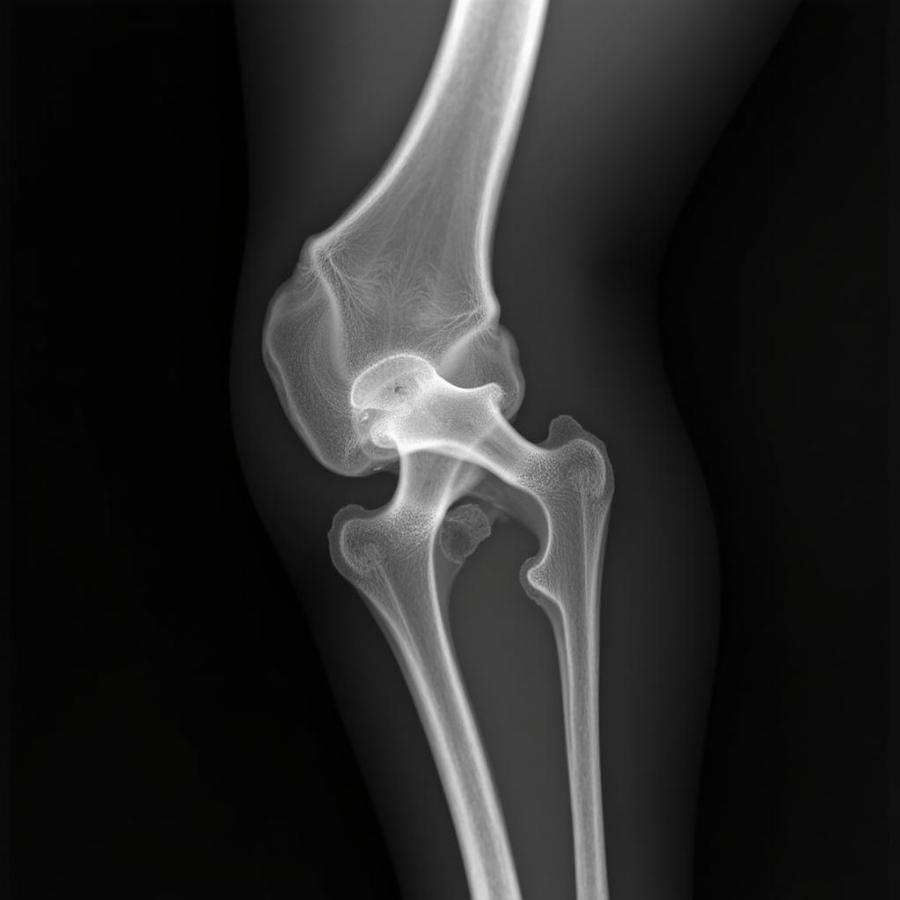Inherited Disorders In Dogs, also known as genetic diseases, are conditions passed down from parents to their offspring through genes. Understanding these disorders is crucial for responsible dog ownership, helping breeders make informed decisions and owners provide appropriate care. These conditions can range from mild to severe, impacting a dog’s overall health and lifespan.
What are Inherited Disorders?
Inherited disorders arise from abnormalities in a dog’s DNA. These abnormalities can be mutations in single genes or involve multiple genes interacting with environmental factors. They can affect various aspects of a dog’s health, including physical characteristics, organ function, and behavior. Some disorders may not manifest until later in life, making early detection through genetic testing crucial in some cases.
Common Inherited Disorders in Dogs
Several inherited disorders are prevalent in specific breeds. Here are a few examples:
- Hip Dysplasia: A common skeletal condition affecting the hip joint, often leading to arthritis and mobility issues, particularly in larger breeds.
- Progressive Retinal Atrophy (PRA): A group of eye diseases causing gradual vision loss, ultimately leading to blindness. Different forms of PRA affect various breeds.
- Von Willebrand’s Disease: A bleeding disorder affecting blood clotting, similar to hemophilia in humans.
- Dilated Cardiomyopathy (DCM): A heart condition where the heart chambers enlarge, reducing its ability to pump blood effectively, often seen in larger breeds.
- Intervertebral Disc Disease (IVDD): A condition affecting the spinal discs, often causing pain, paralysis, and neurological problems, especially in Dachshunds and other long-backed breeds.
 Dog Hip Dysplasia X-Ray Showing Joint Deterioration
Dog Hip Dysplasia X-Ray Showing Joint Deterioration
Recognizing the Signs
Recognizing the signs of inherited disorders can be challenging, as some may be subtle or develop slowly. Regular veterinary check-ups and being attuned to your dog’s behavior are vital. Look for changes in gait, vision, appetite, energy levels, or any unusual behavior. Early detection can significantly improve a dog’s prognosis and quality of life.
Diagnosing Inherited Disorders
Veterinarians use various methods to diagnose inherited disorders, including physical examinations, blood tests, imaging (X-rays, ultrasounds, MRI), and genetic testing. Genetic testing plays a critical role in identifying specific genetic mutations associated with certain disorders. This is especially helpful for breeders in making informed breeding decisions.
Prevention and Management
While inherited disorders cannot be cured, their impact can be minimized through proper management. For some conditions, medication, physical therapy, or surgery may be necessary. Lifestyle adjustments, such as weight management and controlled exercise, can also help alleviate symptoms.
The Importance of Responsible Breeding
Responsible breeding practices play a crucial role in reducing the prevalence of inherited disorders. Breeders should screen their dogs for genetic diseases and make informed decisions about which dogs to breed. This can help prevent passing on harmful genes to future generations.
What if My Dog Has an Inherited Disorder?
If your dog is diagnosed with an inherited disorder, work closely with your veterinarian to develop a management plan. Don’t be afraid to ask questions and seek support from other dog owners facing similar challenges. There are many resources available to help you provide the best possible care for your dog.
Conclusion
Inherited disorders in dogs are a complex issue, but understanding them is vital for responsible dog ownership. By being aware of the signs, diagnostic options, and management strategies, you can help ensure your furry friend lives a happy and healthy life. Don’t hesitate to discuss any concerns with your veterinarian, as early detection and proactive management are key to mitigating the impact of these conditions. Remember, “Dog Care Story” is here to support you every step of the way.
FAQ
- How can I find a reputable breeder who screens for inherited disorders? Look for breeders affiliated with breed clubs and who openly share health testing results.
- Are mixed-breed dogs less prone to inherited disorders? While mixed breeds can have a lower risk of some breed-specific disorders, they can still inherit other genetic conditions.
- Is genetic testing expensive? The cost varies depending on the specific test and laboratory, but it’s a valuable investment for responsible breeding and early detection.
- Can inherited disorders be cured? While they can’t be cured, their impact can be managed effectively with appropriate veterinary care and lifestyle adjustments.
- What resources are available for owners of dogs with inherited disorders? Online support groups, breed-specific organizations, and your veterinarian can provide valuable information and support.
- Are there any preventative measures for inherited disorders? While you can’t prevent the inheritance of genes, responsible breeding and early detection are key to minimizing the impact of these conditions.
- Do all inherited disorders show symptoms early in life? No, some disorders may not manifest until later in life, making regular veterinary check-ups important.
